
-
Vind de juiste voeding voor uw huisdierDoe de quiz en ontdek welke voeding het beste bij uw viervoeter past.Vind de juiste voeding voor uw huisdierDoe de quiz en ontdek welke voeding het beste bij uw viervoeter past.Gezondheids categorieAanbevolen producten
 Sensitive Stomach & Skin hondenvoer met Kip
Sensitive Stomach & Skin hondenvoer met KipHill's Science Plan Sensitive Stomach & Skin Adult Natvoer Hond met Kip is een compleet premium hondenvoer voor volwassen honden vanaf 1 jaar. Deze smaakvlolle paté uit blik is verrijkt met ingrediënten die de spijsvertering en de verzorging van de huid ondersteunen.
Shop Now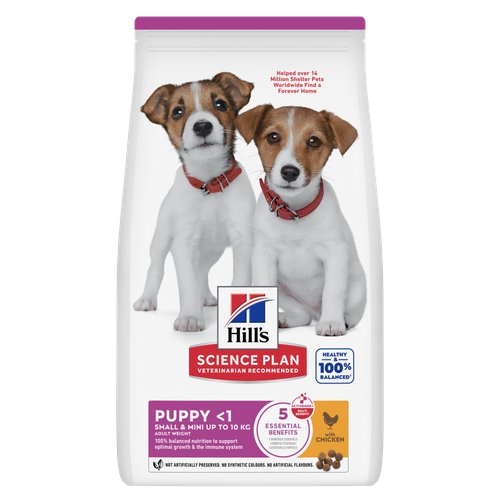 Small & Mini Puppyvoer met Kip
Small & Mini Puppyvoer met KipHill's Science Plan Small & Mini Puppyvoer met Kip is een compleet dierenvoer, speciaal samengesteld met ActivBiome+ Multi-Benefit technologie.
100% gebalanceerde voeding voor optimale groei en een gezond immuunsysteem.Shop Now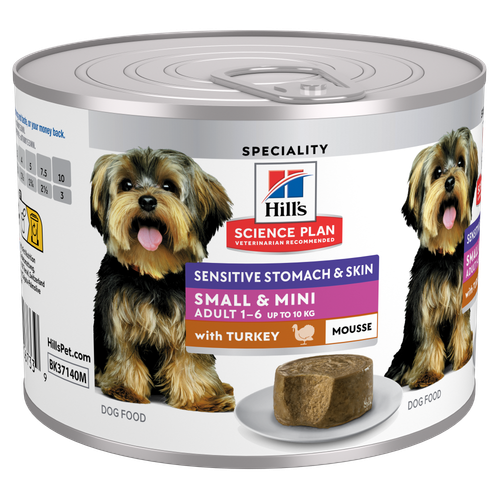 Sensitive Stomach & Skin Small & Mini Adult hondenvoer met Kalkoen
Sensitive Stomach & Skin Small & Mini Adult hondenvoer met KalkoenHill's Science Plan Sensitive Stomach and Skin Small & Mini Adult Natvoer Hond met Kalkoen is een compleet premium dierenvoer voor volwassen honden van een klein ras van 1 tot 6 jaar oud. Deze heerlijke zachte mousse is verrijkt met ingrediënten die de spijsvertering en de verzorging van de huid ondersteunen.
Shop NowGezondheids categorieAanbevolen producten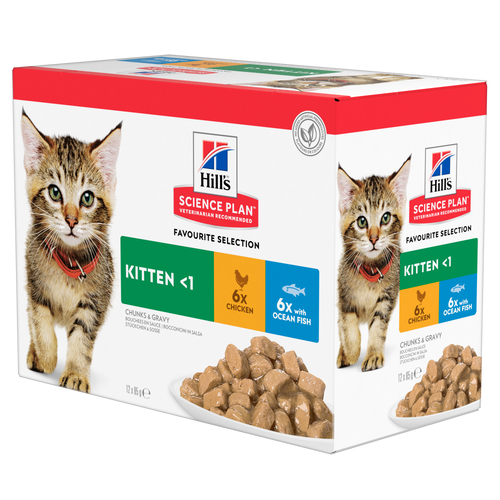 Kitten Natvoer Kip & met Zeevis
Kitten Natvoer Kip & met ZeevisMalse brokjes in saus voor kittens, met omega 3-vetzuren voor een gezonde ontwikkeling van ogen en hersenen en hoogwaardige eiwitten om de spiergroei te ondersteunen. Met gebalanceerde mineralen voor sterke botten en tanden.
Shop Now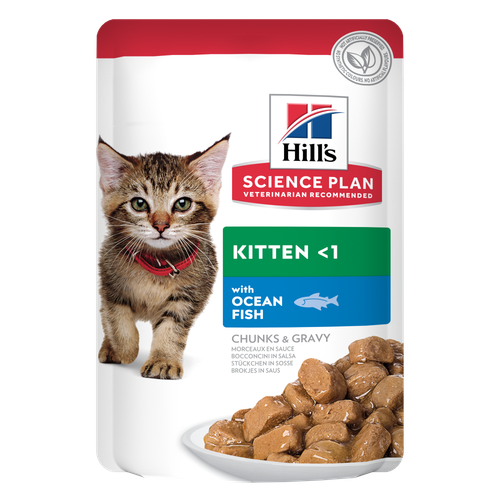 Kitten Natvoer met Zeevis
Kitten Natvoer met ZeevisMalse brokjes in saus voor kittens, met omega 3-vetzuren voor een gezonde ontwikkeling van ogen en hersenen en hoogwaardige eiwitten om de spiergroei te ondersteunen. Met gebalanceerde mineralen voor sterke botten en tanden.
Shop Now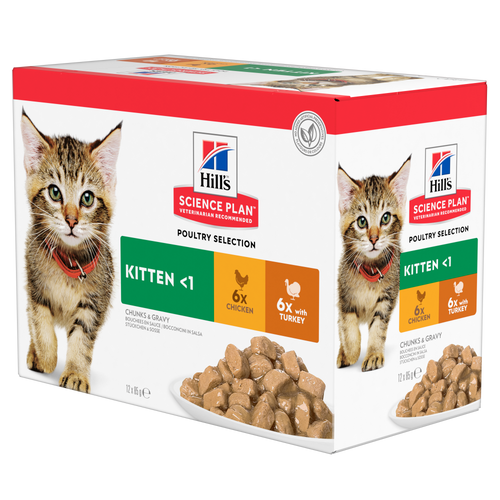 Kitten Natvoer Kip & met Kalkoen
Kitten Natvoer Kip & met KalkoenMalse brokjes in saus voor kittens, met omega 3-vetzuren voor een gezonde ontwikkeling van ogen en hersenen en hoogwaardige eiwitten om de spiergroei te ondersteunen. Met gebalanceerde mineralen voor sterke botten en tanden.
Shop Now -
Hond
- Hondentips & artikelen
-
Hond gezondheids categorie
- Gewicht
- Voedsel- & milieugevoeligheden
- Urinewegen
- Spijsvertering
- Gewrichten
- Nieren
- Herstellende zorg
- Mondverzorging
-
Hond levensstadium
- Puppyvoeding
- Volwassen voeding
- Senior voeding
Kat- Kattentips & artikelen
-
Kat gezondheids categorie
- Gewicht
- Huid- & voedselgevoeligheden
- Urinewegen
- Spijsvertering
- Nieren
- Haarbal & perfecte vacht
- Herstellende zorg
- Mondverzorging
- Stress
-
Kat levensstadium
- Kittenvoeding
- Volwassen voeding
- Senior voeding
Uitgelichte artikelen Laat zien dat je van ze houdt met natvoer: een geweldige keus voor huisdieren met gezondheidsklachten
Laat zien dat je van ze houdt met natvoer: een geweldige keus voor huisdieren met gezondheidsklachtenLaat zien dat je van ze houdt met natvoer: een geweldige keus voor huisdieren met gezondheidsklachten
Read More De ongelooflijke wetenschap achter het microbioom van je huisdier
De ongelooflijke wetenschap achter het microbioom van je huisdierOntdek wat het microbioom van je huisdier is, hoe het bijdraagt aan het darmsysteem en de algehele gezondheid en waarom voeding belangrijk is bij het in stand houden van gezonde microbiomen.
Read More The Right Diet For Your Pet
The Right Diet For Your PetIn people, the right diet is very important. If you are eating the wrong way for your metabolism, activity level, age and lifestyle you could end up with health issues. The same goes for your pet.
Read More -

 Wetenschappelijk onderbouwde voeding creëert verschillen die u kunt vertrouwen.
Wetenschappelijk onderbouwde voeding creëert verschillen die u kunt vertrouwen.
Chronische nierziekte bij honden
Chronische nierziekte bij honden
Wat is nierziekte bij honden?
Chronische nierziekte (CKD) wordt gedefinieerd als een afwijking van één of beide nieren die al meerdere maanden aanwezig is. CKD komt voor bij ongeveer 1 op de 10 honden [1].
wat veroorzaakt nierziekte bij honden?
Er zijn twee hoofdvormen van nierziekte bij honden: acuut en chronisch. Symptomen van acute nierziekte ontwikkelen zich meestal in een week of maand, terwijl chronische nierziekte inhoudt dat de schade aan de nieren al minstens drie maanden aanwezig is. Veelvoorkomende oorzaken van nierziekte en het verergeren daarvan zijn:




vroege opsporing van nierfalen bij je hond
Symptomen van ernstige ziekte verschijnen pas als 75% van de nierfunctie al verloren is gegaan [1], dus hoe eerder nierziekte wordt vastgesteld, hoe meer tijd je hebt om het probleem aan te pakken of de achteruitgang te vertragen. CKD is progressief en niet omkeerbaar, maar je dierenarts kan helpen met langdurige zorg en laten zien waar je bij oudere honden op moet letten.
wat zijn de symptomen en signalen van nierziekte bij honden?
De signalen van beginnende nierziekte zijn niet zichtbaar. Bij de diagnose is CKD meestal al langer aanwezig, maar kan soms worden aangepakt met speciale, door de dierenarts goedgekeurde voeding voor nierziekte. Symptomen in een later stadium lijken hierop, maar zijn een stuk duidelijker voor baasjes.


















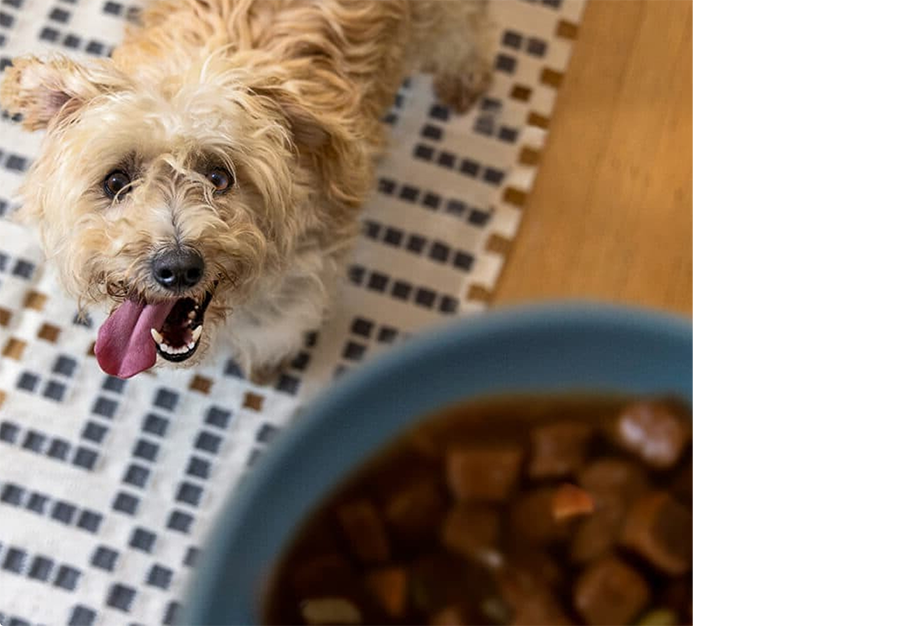
voeding voor honden met nierziekte
Als je hond nierproblemen heeft, kan de juiste voeding een groot verschil maken in de kwaliteit van leven en misschien zelfs de levensduur verlengen. Speciaal samengestelde voeding voor honden met nierziekte bevat meestal minder eiwitten en fosfor dan gewone diervoeding. Beperking van fosfor kan de ernst van symptomen verminderen en de achteruitgang van de nieren vertragen, terwijl gecontroleerde, hoogwaardige eiwitten helpen om schadelijke afvalstoffen te beperken.
voed het microbioom van je huisdier
Nieuw bewijs toont een verband tussen darmgezondheid en niergezondheid [2]. Voeding met ingrediënten die het microbioom ondersteunen, kan helpen om schadelijke afvalstoffen in de nieren te beperken.
hoe zit het met voedingsgist voor honden met nierziekte?
Hoewel het online vaak wordt genoemd, bevat gist relatief veel fosfor, wat een punt van zorg is voor honden met CKD. Ook wordt op veel websites aangeraden om rauwe diëten te geven aan honden met nierproblemen, zonder alle risicofactoren te benoemen (denk aan besmettingsgevaar, de juiste voedingsbalans en de kosten). Overleg altijd met je dierenarts als je voedingsopties overweegt voor een hond met nierziekte.
voeding voor honden met nierziekte
Als je hond nierproblemen heeft, kan de juiste voeding een groot verschil maken in de kwaliteit van leven en misschien zelfs de levensduur verlengen. Speciaal samengestelde voeding voor honden met nierziekte bevat meestal minder eiwitten en fosfor dan gewone diervoeding. Beperking van fosfor kan de ernst van symptomen verminderen en de achteruitgang van de nieren vertragen, terwijl gecontroleerde, hoogwaardige eiwitten helpen om schadelijke afvalstoffen te beperken.
voed het microbioom van je huisdier
Nieuw bewijs toont een verband tussen darmgezondheid en niergezondheid [2]. Voeding met ingrediënten die het microbioom ondersteunen, kan helpen om schadelijke afvalstoffen in de nieren te beperken.
hoe zit het met voedingsgist voor honden met nierziekte?
Hoewel het online vaak wordt genoemd, bevat gist relatief veel fosfor, wat een punt van zorg is voor honden met CKD. Ook wordt op veel websites aangeraden om rauwe diëten te geven aan honden met nierproblemen, zonder alle risicofactoren te benoemen (denk aan besmettingsgevaar, de juiste voedingsbalans en de kosten). Overleg altijd met je dierenarts als je voedingsopties overweegt voor een hond met nierziekte.
Aanbevolen producten voor honden met nierproblemen
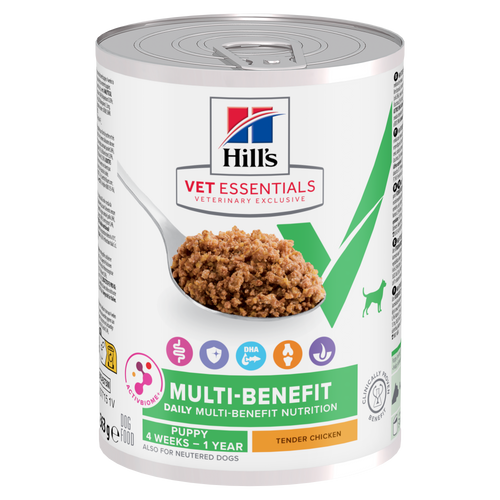
Hill's Vet Essentials Multi-Benefit Natvoer voor Pups met Kip is voeding met meerdere gezondheidsvoordelen. Dit voer is exclusief verkrijgbaar bij de dierenarts en geschikt voor pups van kleine en middelgrote rassen tot de leeftijd van 12 maanden. Het is klinisch bewezen dat het de behoeften van je pup ondersteunt tijdens de groei en ontwikkeling. Onze ActivBiome+ prebiotische vezelmix voedt hun ontwikkelende microbioom, voor een gezonde spijsvertering en hun algemeen welzijn. Samengesteld met omega 3-vetzuren om de ontwikkeling van de hersenen te ondersteunen en met antioxidanten ter ondersteuning van het ontwikkelende immuunsysteem. De beste ondersteuning voor nu en de toekomst.
De gezondheidsvoordelen van het natvoer zijn vergelijkbaar met die van ons droogvoer. Natvoer kan helpen om de vochtinname van je huisdier te verhogen en het is een goede manier om je hond meer variatie te bieden, door natvoer en droogvoer op verschillende manieren te combineren.
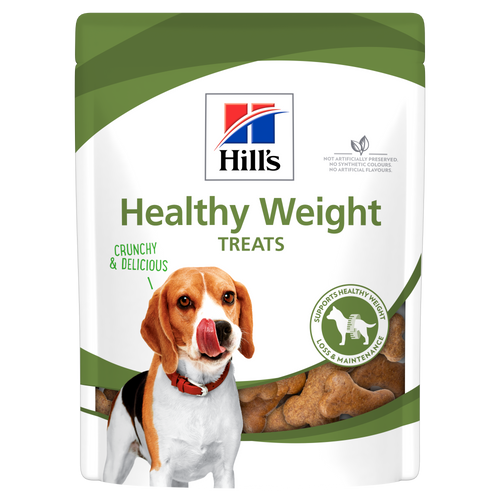
Hill's Healthy Weight Hondensnacks zijn smakelijke en gezonde snacks voor honden van 1 jaar en ouder, om een gezond gewichtsverlies en -controle te ondersteunen.
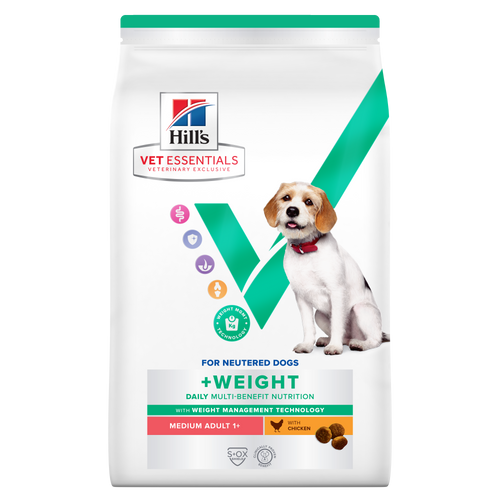
Hill's Vet Essentials Multi-Benefit + Weight Adult 1+ Medium Hondenvoer met Kip is voeding met meerdere gezondheidsvoordelen. Dit voer is exclusief verkrijgbaar bij de dierenarts en geschikt voor middelgrote honden van 1 jaar en ouder na de castratie of sterilisatie, of voor honden met aanleg voor overgewicht. Het is samengesteld om een gezond gewicht te ondersteunen en ter bevordering van een gezonde spijsvertering en gezonde gewrichten. Onze unieke technologie voor gewichtscontrole helpt honden om vet te verbranden en een gezond gewicht te bereiken en te behouden. De beste ondersteuning voor nu en de toekomst.
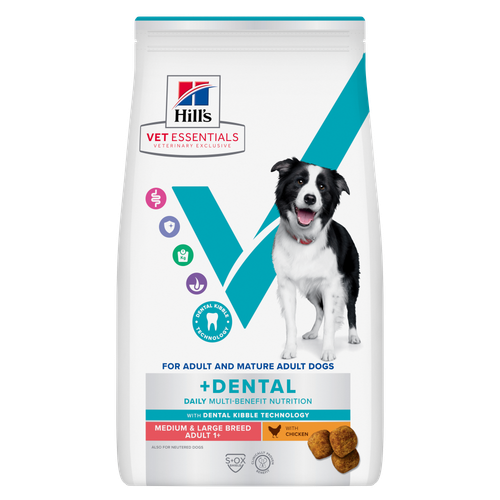
Hill's Vet Essentials Multi-Benefit + Dental Adult 1+ Medium & Large Breed Hondenvoer met Kip is voeding met meerdere gezondheidsvoordelen. Dit voer is exclusief verkrijgbaar bij de dierenarts en geschikt voor middelgrote en grote honden van 1 jaar en ouder. De klinisch bewezen broktechnologie vermindert de opbouw van tandplak en tandsteen en helpt het tandvlees gezond te houden terwijl je hond eet. De beste ondersteuning voor nu en de toekomst.
gerelateerde artikelen

De mogelijke oorzaken van jeuk bij honden en wat je eraan kan doen. Geef je hond verlichting met het deskundige advies van Hill's.
Ontdek de oorzaken, tekenen en behandelingen van nierziekten bij honden en kom meer te weten over methodes om de nieren van je hond gezond te houden. Lees meer bij Hill's.
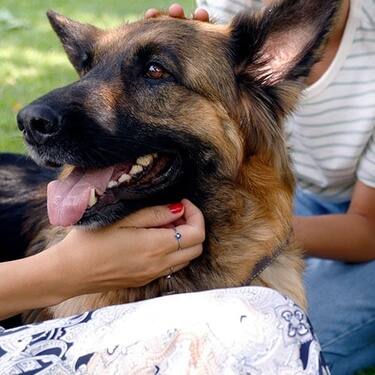
Het leven van een hond gaat niet altijd over rozen. De stress van het leven kan van grote invloed zijn op de spijsvertering en de algehele gezondheid van je hond. Ontdek meer met Hill's.
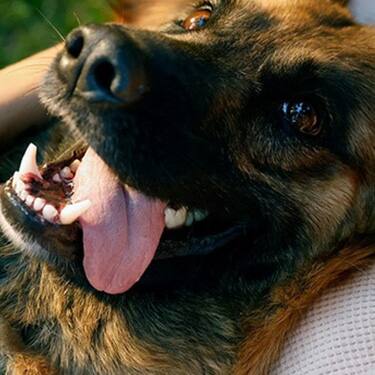
Ontdek waarom je bloed ziet in de ontlasting van je hond. Bloed opmerken kan ontzettend verontrustend zijn, maar er zijn enkele veelvoorkomende oorzaken waar je op kunt letten.
References: 1Lulich JP, Osborne CA, O’Brien TD, Polzin DJ. Feline renal failure: questions, answers, questions. Compend Contin Educ Pract Vet. 1992;14(2):127–153. Brown SA. Renal dysfunction in small animals. The Merck Veterinary Manual website.